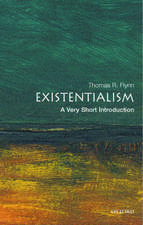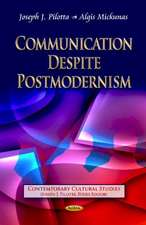The Philosophy of Ontological Lateness: Merleau-Ponty and the Tasks of Thinking: Bloomsbury Studies in Continental Philosophy
Autor Keith Whitmoyeren Limba Engleză Paperback – 20 mar 2019
| Toate formatele și edițiile | Preț | Express |
|---|---|---|
| Paperback (1) | 230.24 lei 6-8 săpt. | |
| Bloomsbury Publishing – 20 mar 2019 | 230.24 lei 6-8 săpt. | |
| Hardback (1) | 714.61 lei 6-8 săpt. | |
| Bloomsbury Publishing – 6 sep 2017 | 714.61 lei 6-8 săpt. |
Din seria Bloomsbury Studies in Continental Philosophy
- 14%
 Preț: 179.26 lei
Preț: 179.26 lei - 23%
 Preț: 179.10 lei
Preț: 179.10 lei - 13%
 Preț: 238.22 lei
Preț: 238.22 lei - 31%
 Preț: 772.98 lei
Preț: 772.98 lei - 30%
 Preț: 773.39 lei
Preț: 773.39 lei - 14%
 Preț: 888.65 lei
Preț: 888.65 lei - 22%
 Preț: 772.98 lei
Preț: 772.98 lei - 13%
 Preț: 258.33 lei
Preț: 258.33 lei - 23%
 Preț: 256.02 lei
Preț: 256.02 lei - 30%
 Preț: 715.00 lei
Preț: 715.00 lei -
 Preț: 255.66 lei
Preț: 255.66 lei - 22%
 Preț: 773.06 lei
Preț: 773.06 lei - 14%
 Preț: 891.10 lei
Preț: 891.10 lei - 30%
 Preț: 774.20 lei
Preț: 774.20 lei - 13%
 Preț: 257.97 lei
Preț: 257.97 lei - 30%
 Preț: 715.00 lei
Preț: 715.00 lei - 22%
 Preț: 774.62 lei
Preț: 774.62 lei - 13%
 Preț: 256.20 lei
Preț: 256.20 lei -
 Preț: 256.59 lei
Preț: 256.59 lei - 22%
 Preț: 257.50 lei
Preț: 257.50 lei - 13%
 Preț: 257.03 lei
Preț: 257.03 lei - 13%
 Preț: 257.68 lei
Preț: 257.68 lei - 13%
 Preț: 258.15 lei
Preț: 258.15 lei - 30%
 Preț: 715.19 lei
Preț: 715.19 lei - 13%
 Preț: 256.49 lei
Preț: 256.49 lei - 22%
 Preț: 891.10 lei
Preț: 891.10 lei -
 Preț: 255.94 lei
Preț: 255.94 lei - 13%
 Preț: 236.45 lei
Preț: 236.45 lei - 30%
 Preț: 714.92 lei
Preț: 714.92 lei - 30%
 Preț: 773.81 lei
Preț: 773.81 lei - 22%
 Preț: 772.98 lei
Preț: 772.98 lei - 22%
 Preț: 889.08 lei
Preț: 889.08 lei - 30%
 Preț: 714.61 lei
Preț: 714.61 lei -
 Preț: 256.59 lei
Preț: 256.59 lei - 14%
 Preț: 772.98 lei
Preț: 772.98 lei - 22%
 Preț: 257.68 lei
Preț: 257.68 lei - 22%
 Preț: 891.75 lei
Preț: 891.75 lei - 30%
 Preț: 773.81 lei
Preț: 773.81 lei
Preț: 230.24 lei
Preț vechi: 264.77 lei
-13% Nou
Puncte Express: 345
Preț estimativ în valută:
44.06€ • 45.100$ • 36.46£
44.06€ • 45.100$ • 36.46£
Carte tipărită la comandă
Livrare economică 05-19 aprilie
Preluare comenzi: 021 569.72.76
Specificații
ISBN-13: 9781350105706
ISBN-10: 1350105708
Pagini: 224
Dimensiuni: 156 x 234 x 18 mm
Greutate: 0.32 kg
Editura: Bloomsbury Publishing
Colecția Bloomsbury Academic
Seria Bloomsbury Studies in Continental Philosophy
Locul publicării:London, United Kingdom
ISBN-10: 1350105708
Pagini: 224
Dimensiuni: 156 x 234 x 18 mm
Greutate: 0.32 kg
Editura: Bloomsbury Publishing
Colecția Bloomsbury Academic
Seria Bloomsbury Studies in Continental Philosophy
Locul publicării:London, United Kingdom
Caracteristici
The book is clearly structured and is written in a remarkably accessible and engaging style
Notă biografică
Keith Whitmoyer is Adjunct Assistant Professor at Pace University, the School of Visual Arts, and the New York City College of Technology, USA.
Cuprins
1. IntroductionPart I: Cruel Thought2. First Chapter, Interrogation, Cruel Thought and Inquisition3. Second Chapter, Cruel Thought and the Object4. Third Chapter, Cruel Thought and a Consciousness Without Fissures5. Fourth Chapter, Transcendental Contamination and the Permanent Dissonance of BeingPart II: The Deflagration of Sense6. Fifth Chapter, Le sentir and the Genesis of Sense: Perceptual Synthesis and Temporality7. Sixth Chapter, Temporality disparue8. Seventh Chapter, Freedom and Lateness to BecomingPart III: Philosophy of Weakness, Philosophy of Lateness9. Eighth Chapter, Merleau-Ponty's Eulogy to Philosophy10. Ninth Chapter, The Lateness of Philosophy11. Tenth Chapter, Fugitive Love: At the Point of Departure12. Conclusion
Recenzii
[Whitmoyer's] reading of Merleau-Ponty is accurate and deep, but what makes it original is its tone ... [His] reading of Merleau-Ponty's texts ... is reliable and often deep and insightful.
Whitmoyer has an interesting and original take on Merleau-Ponty's conception of phenomenology. He is particularly illuminating on the difficult later works.
The Philosophy of Ontological Lateness offers a sustained consideration of the paradoxical matrix of anxiety and desire that shaped Merleau-Ponty's metaphilosophical temperament as profoundly retardé. Embracing this belatedness by turns systematic and lyrical, Whitmoyer interlaces his reading of Merleau-Ponty with an evocative meditation on the precarious contingency of human finitude and the consequent need to come to terms with love and faith as essential conditions of any viable conception of philosophical reason.
Whitmoyer has an interesting and original take on Merleau-Ponty's conception of phenomenology. He is particularly illuminating on the difficult later works.
The Philosophy of Ontological Lateness offers a sustained consideration of the paradoxical matrix of anxiety and desire that shaped Merleau-Ponty's metaphilosophical temperament as profoundly retardé. Embracing this belatedness by turns systematic and lyrical, Whitmoyer interlaces his reading of Merleau-Ponty with an evocative meditation on the precarious contingency of human finitude and the consequent need to come to terms with love and faith as essential conditions of any viable conception of philosophical reason.
















